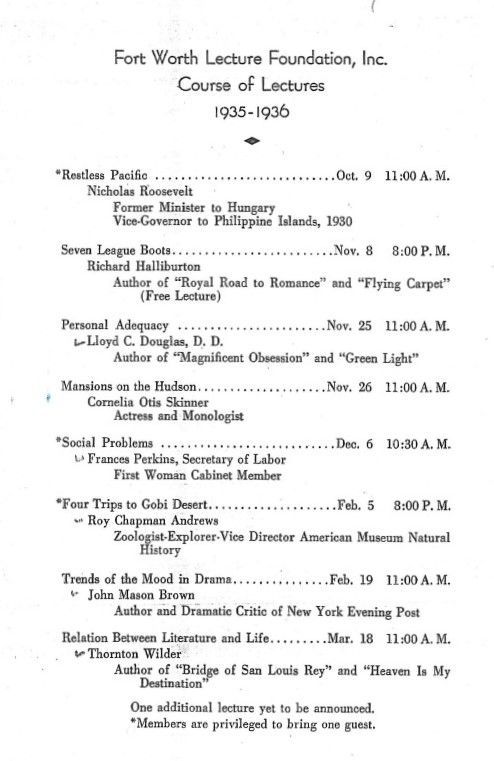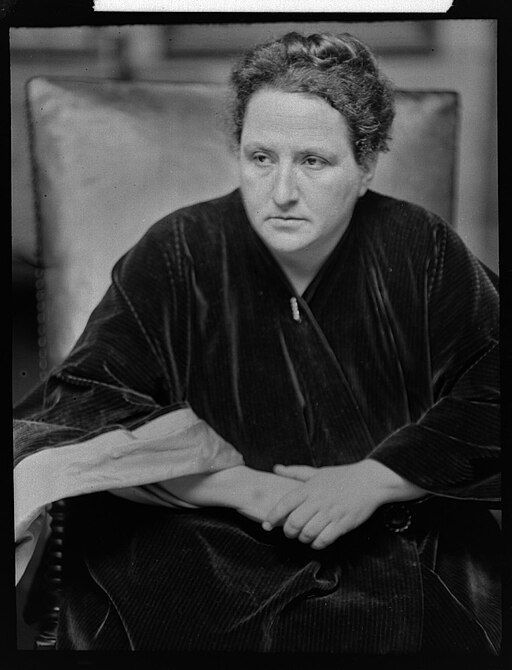About the Fort Worth Lecture Foundation

In March 1935, a group of smart, educated women came together to form the Fort Worth Lecture Foundation.
During a time when women were confined mostly to the home, these women wanted to expand their horizons.
Eager to learn new ideas, they brought a diverse group of speakers to Fort Worth to speak to their members, including authors and poets like Gertrude Stein and Edna St. Vincent Millay, artists such as Salvadore Dali, and politicians including Winston Churchill's grandson and Princess Rudivoravan of Siam.
The Fort Worth Lecture Foundation grew as daughters joined their mothers and granddaughters and friends invited friends.
Today the Lecture Foundation has 800 members with a number of women waiting for spots to open.
The First Lecture
On March 27, 1935, Gertrude Stein gave the first lecture to the members of the Fort Worth Lecture Foundation.
Gertrude Stein (1874-1946) was an American writer and art collector whose avant-garde literary work profoundly impacted the modernist movement. As a pioneering expatriate in Paris, Stein's famed salon gatherings attracted influential artists like Picasso and Hemingway. An advocate for modern art, she collected works by artists like Matisse and Cézanne. Stein's contributions to literature and her role in fostering creativity made her a significant figure in the early 20th-century cultural landscape.
After the inaugural lecture by Gertude Stein in March of 1935, the first full slate of speakers began in October 1935.
The first set of speakers included:
- Nicholas Roosevelt (1893-1982) was an American diplomat and government official. He held the position of U.S. Minister to Hungary from 1930 to 1933. His diplomatic service in Hungary occurred during a crucial period when Hungary was navigating significant political and economic changes.
- Richard Halliburton (1900-1939) was an American adventurer, author, and travel writer. Some of his most famous books include "The Royal Road to Romance" (1925) and "The Glorious Adventure" (1927), which chronicled his travels in various parts of the world, often focusing on historical and cultural elements.
- Lloyd C. Douglas (1877-1951) was an American minister and author best known for his inspirational and religious fiction. He served as a Congregational minister before pursuing a successful career as a writer. Douglas's most famous work is the novel "The Robe," published in 1942, which tells the story of a Roman soldier's encounter with Jesus Christ during the crucifixion. The book was a major bestseller and later adapted into a popular film.
- Cornelia Otis Skinner (1901-1979) was an American actress, author, and monologist known for her one-woman shows and her contributions to the world of theater and literature. She was born into a family with a strong theatrical tradition, and her mother, Otis Skinner, was a renowned actor.
- Frances Perkins (1880-1965) was an American sociopolitical trailblazer and the first woman to serve in a U.S. presidential cabinet. She held the position of Secretary of Labor under President Franklin D. Roosevelt from 1933 to 1945. In this role, she played a pivotal role in crafting and implementing numerous New Deal policies and labor reforms during the Great Depression.
- Roy Chapman Andrews (1884-1960) was an American explorer, adventurer, and paleontologist best known for leading the Central Asiatic Expeditions in the 1920s. His most famous discovery during that time was the first finding of dinosaur eggs, providing critical insights into the reproduction and behavior of dinosaurs. Andrews served as the director of the American Museum of Natural History and was a key figure in the world of paleontology and scientific exploration.
- John Mason Brown (1900-1969) was an American theater critic, author, and commentator. He was an influential voice in the field of drama and the performing arts, known for his insightful and often witty reviews. Brown is best known for his work as a theater critic for The New York Post and later for Saturday Review. In addition to his work as a critic, he was a successful author, writing several books on theater, literature, and other topics.
- Thornton Wilder (1897-1975) was an acclaimed American playwright and novelist known for his significant contributions to American literature and theater. He is most celebrated for his works that explore the human experience and the passage of time. His most famous works include "Our Town," a play that explores the simplicity of small-town life and the importance of cherishing the present; "The Bridge of San Luis Rey," a novel that examines fate and the interconnectedness of human lives; and "The Skin of Our Teeth," a play that reflects human resilience in the face of historical challenges.

